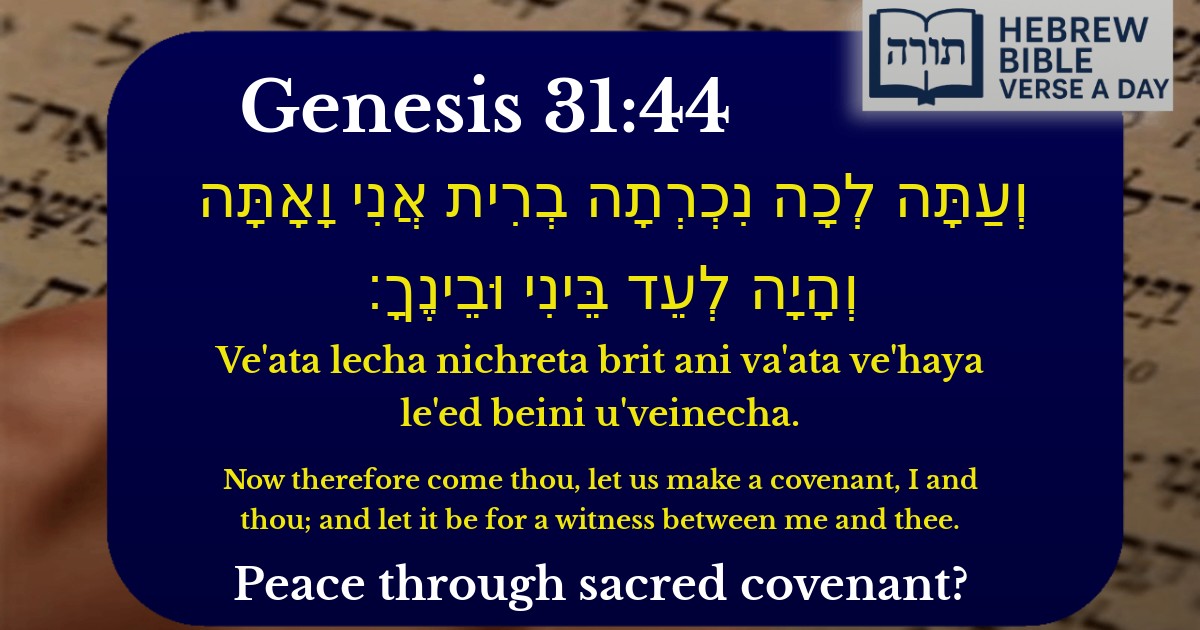Frequently Asked Questions
Q: What does Genesis 31:44 mean?
A: In Genesis 31:44, Laban proposes making a covenant (brit) with Jacob to establish peaceful terms between them after their disputes. According to Rashi, this covenant was meant to prevent future conflicts and serve as a witness that neither would cross the designated boundary to harm the other.
Q: Why is a covenant important in this verse?
A: A covenant (brit) is a sacred agreement in Judaism, often involving mutual obligations. Here, Laban and Jacob formalize their peaceful intentions through this covenant, as explained by Ramban (Nachmanides), showing that even strained relationships can be resolved through commitment and divine witness.
Q: What can we learn from Genesis 31:44?
A: This verse teaches the importance of resolving conflicts through mutual agreements and trust. The Midrash highlights that Jacob and Laban, despite their differences, sought peace. This aligns with Jewish values of pursuing shalom (peace) and avoiding unnecessary strife.
Q: How does Genesis 31:44 apply today?
A: The principle of making agreements to ensure peace remains relevant. The Talmud (Sanhedrin 6b) emphasizes the value of compromise and peaceful resolutions. Like Jacob and Laban, we should seek fair and binding solutions to disputes in personal and communal relationships.
Q: What was the purpose of the 'witness' in this covenant?
A: The witness (ed) mentioned in the verse, as explained by Ibn Ezra, was likely a physical marker, such as the pile of stones they set up (mentioned later in the passage). This served as a lasting reminder of their agreement, a common practice in biblical covenants to ensure accountability.


Context of the Verse
This verse (Genesis 31:44) is part of the narrative where Yaakov (Jacob) and Lavan (Laban) establish a covenant (ברית) after Yaakov flees from Lavan's household. The covenant serves as a formal agreement to prevent future hostilities between them. The verse reflects the mutual desire for peace and a binding witness to their agreement.
Rashi's Commentary
Rashi explains that Lavan proposes this covenant to ensure that Yaakov will not harm him or his family in the future. The phrase "נִכְרְתָה בְרִית" ("let us make a covenant") is significant, as the term "כריתת ברית" (cutting a covenant) is a common biblical expression for establishing a solemn agreement, often accompanied by a symbolic act (such as the division of animals in Genesis 15). Rashi emphasizes that the covenant is bilateral, binding both parties.
Rambam's Perspective on Covenants
Rambam (Maimonides), in Hilchot Melachim, discusses the halachic framework for treaties and covenants between nations or individuals. He notes that such agreements must be made with sincerity and mutual respect, as seen here between Yaakov and Lavan. The covenant is not merely a social contract but carries spiritual weight, invoking divine witness (as seen in the subsequent verses with the heap of stones and pillar).
Midrashic Insights
Halachic Implications
The Talmud (Sanhedrin 6a) discusses the importance of peaceful resolutions and covenants, teaching that reconciliation (פשרה) is preferable to strict judgment. Yaakov and Lavan's covenant exemplifies this principle, demonstrating how even contentious relationships can be resolved through mutual agreement and divine oversight.
Symbolism of the Covenant
The covenant between Yaakov and Lavan is not merely a political agreement but also a spiritual one. The invocation of divine witness (later referenced as "the G-d of Avraham and the G-d of Nachor") underscores that such agreements are sanctified and upheld by divine authority. This aligns with the broader Torah theme that covenants—whether between individuals or between G-d and Israel—are sacred and inviolable.